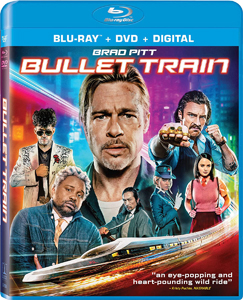I gave positive reviews to director David Leitch’s “Deadpool 2” and “Fast & Furious Presents: Hobbs & Shaw,” but they won me over with a blitz of entertainment more so than penetrating to my heart and mind. I’m a little too worn down by his 2022 film, “Bullet Train.”
Written by Zak Olkewicz (“Fear Street Part Two: 1978”), “Bullet Train” has an unmistakable veneer of being an entertainment product. It doesn’t have Deadpool literally commenting on the proceedings to the audience. But everyone is a capital-C character – crafted, contrived, commodified.
Speeding through its silliness
“Bullet Train” is extremely violent but – coming in an age where most action movies are extremely violent – that has little impact. That holds true with most aspects of the film. It’s totally conscious and mildly snarky in its aims to be a movie of the moment. As such, it ends up being nothing much – technically well-crafted, but not something I’d return to.
“Bullet Train” (2022)
Director: David Leitch
Writers: Zak Olkewicz (screenplay), Kôtarô Isaka (book)
Stars: Brad Pitt, Joey King, Aaron Taylor-Johnson
Leitch, who did uncredited directorial work on the groundbreaking gun-fu actioner “John Wick,” comes from an action background. And herein lies the core fun of “Bullet Train,” wherein people from several (mostly criminal) backgrounds coincidentally (so it seems) cross paths on a Japanese high-speed rail.
Olkewicz includes dialog mocking movies that aren’t about anything, thus placing the lampshade. The film is actually very much about fate – but only because everyone keeps talking about it. This comes in jibing (Brad Pitt’s operative gets the nickname Ladybug from his handler because he’s lucky) and serious fashion (Hiroyuki Sanada’s Elder gets philosophical).
Indeed, the most impressively choreographed action finds Ladybug successfully defending himself from knife-, gun- and sword-wielding opponents by being lucky. He raises the maguffin briefcase like a shield and the knife bounces off it, killing his assailant. Boosted by Pitt’s easy charms as the bad guy who’s really not so bad, it’s reasonably fun stuff.
Stars all aboard
Olkewicz draws his characters clearly, but – outside of Ladybug — he’s not at a Shane Black level of making us love them. As such, a parade of big-name stars provides more fun (for me, anyway, since I didn’t peek at the cast list).
Who is in the mascot costume? Who is Ladybug’s handler on the other end of the phone line? Who is the White Death who has hired “twins” Tangerine (“Kick-Ass’s” Aaron Taylor-Johnson) and Lemon (“Atlanta’s” Brian Tyree Henry) and – for different reasons — drawn the ire of both narcissistic schemer Prince (Joey King) and the wise and principled Elder?

Seeing who plays the roles is more fun than trying to follow the narrative – although, arguably, you don’t have to. The film is a series of action scenes, stunts and surprising ways in which the stakes rise. (One element got me wondering: Why haven’t we gotten a “Snakes on a Train” yet?). It’s enough to know the combatants in a given scene don’t like each other – for that moment – and “Bullet Train” establishes those basics clearly enough.
An overlong ride
For about half of its 2 hours and 7 minutes (overlong like so many modern tentpole films), “Bullet Train” stays on the track of realism (within the film’s extreme context). When a character climbs on the outside of the train, it’s a step too far. It’s dangerous to ride atop normal trains, even though it’s often done in movies. It’s impossible to ride atop a bullet train.
Maybe Leitch is setting us up for the even more impossible stuff that happens in the grand finale. Pitt’s character essentially has the superpower of luck. (How has the superhero era influenced even non-superhero films? Discuss.) But for anyone else to survive what happens at the end is absolutely insane.
We were never supposed to take “Bullet Train” seriously, apparently. There’s a better version of this premise out there with sharper characterizations and a serious engagement with the theme of fate. This is the David Leitch version where action with a slight wink is the purpose. If that’s what you came for, you can’t complain.

